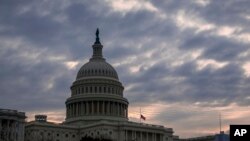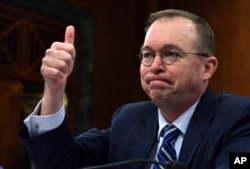There were no public signs Monday of ending a stalemate over U.S. government spending that threatens to partially shut down federal agencies at midnight Friday.
The White House gave no indication of what funding plan it might accept to avert closing about a quarter of U.S. operations, a dispute that centers on President Donald Trump's proposed wall along the U.S.-Mexican border to thwart illegal immigration.
Trump has called for a $5 billion down payment for the $20 billion wall, but his plan is adamantly opposed by Democrats and some Republicans, leaving its fate in doubt.Democrats have offered a maximum of $1.6 billion, for enhanced border security, not specifically for the wall.
On Monday, Trump attacked Democratic opposition to the wall.
"Anytime you hear a Democrat saying that you can have good Border Security without a Wall, write them off as just another politician following the party line," the U.S. leader said on Twitter."Time for us to save billions of dollars a year and have, at the same time, far greater safety and control!"
Meanwhile, lawmakers waited for word from the White House on how it wants to end the impasse and scheduled no funding votes until Wednesday at the earliest.
Trump last week said he would proudly shut down the government if money is not included for his wall. But to avert a Friday shutdown he also could reach agreement on some kind of stopgap spending plan to carry all government operations through the end of this year and into 2019. Aside from Homeland Security, funding is at stake for the State Department, the Department of Justice and the Interior Department.
Analysts estimate about 380,000 federal workers could be furloughed.
Impact abroad?
Overseas, U.S. embassies have "essential" staff members who will continue to perform basic duties. Whether locally employed staff will be able to work is dependent on the labor laws in each individual country. In past shutdowns, individual embassies have posted on social media about any adjustments to their services and largely functioned as normal.
The State Department told VOA that information on how embassies would be affected by this shutdown is not yet available.
Passport and consular services are generally funded by service fees and thus are unlikely to be affected during a government shutdown. During the brief January shutdown this year, passport services functioned effectively as normal. But Americans waiting for a passport to be processed may face delays and logistical hurdles as some federal buildings housing passport offices may be closed.
Currently, the U.S. passport service hotline says that passports are being processed at the normal rate, with expected deliveries four to six weeks after the submission of an application. Should the shutdown last long enough to deplete current funds from service fees, passport processing could be suspended.
Friday deadline, 'essential' employees
National parks have shut down in the past, but during the shutdowns earlier this year, the head of the Office of Budget and Management, Mick Mulvaney, pledged that they would be kept open.
Experts say the Internal Revenue Service may not be able to process tax refunds. Health safety inspections could be stalled. Most employees at the U.S. space agency NASA would likely be furloughed and might not get paid for that time, although Congress usually grants pay retroactively after a shutdown is over.
About 420,000 federal workers are deemed "essential" and are expected to remain on the job.
Voice of America continues to broadcast, and air traffic controllers are usually expected to keep working — along with FBI agents, members of the Transportation Security Administration, and the Secret Service agents that protect the president. Like the furloughed workers, they may not see any pay until after the shutdown concludes.
How long? Who to blame?
In a meeting last week at the White House, Trump told the top two Democratic congressional leaders, House Speaker-designate Nancy Pelosi and Senate Minority Leader Chuck Schumer, that he would be happy to take responsibility for a government shutdown rather than give up any ground on the border wall issue.
If the government is forced into a partial shutdown, it could be short, like the two that took place early this year — the first lasted three days, and the second lasted only about six hours.
Or it could resemble the longest shutdown in U.S. history, which started December 16, 1995, and ended 21 days later. The second longest occurred in October 2013, when the government closed for 16 days, costing it $2.5 billion in wages and benefits to workers who were not allowed to do their jobs because they were furloughed, according to the U.S. Office of Management and Budget.
With each shutdown come questions about what federal services will and will not be provided. Generally, agencies or offices funded by service fees, such as U.S. Citizenship and Immigration Services, can continue their work, so the shutdown would not affect naturalization interviews or citizenship ceremonies.
Russia probe protections
The Friday deadline is the result of a spending agreement Congress reached in September and the death of a former president.
The September measure set a December 7 deadline for passing the seven spending bills that remain outstanding. That deadline was pushed back two weeks after the death November 30 of former U.S. President George H.W. Bush, whose funeral ceremonies were held the following week.
In one more possible hurdle, Schumer has indicated that the Democrats might block the spending bill unless Congress also approves a bill protecting special counsel Robert Mueller's investigation of Trump 2016 campaign links to Russia and whether Trump, as president, obstructed justice by trying to thwart the probe.
A looming shutdown is not expected to affect the investigation because it is funded with an appropriation that does not require renewal.
Marissa Melton contributed to this report.








